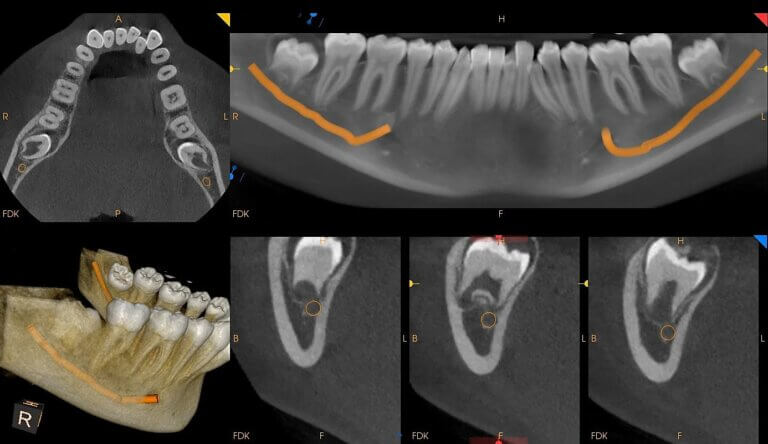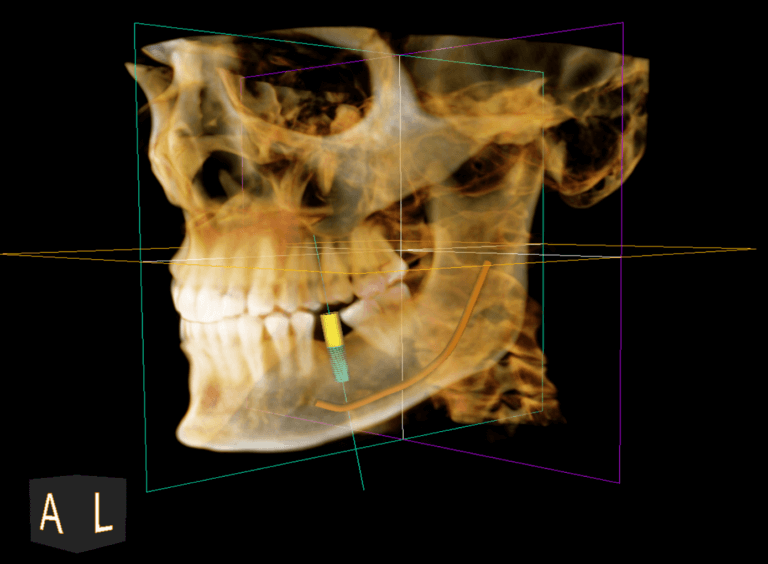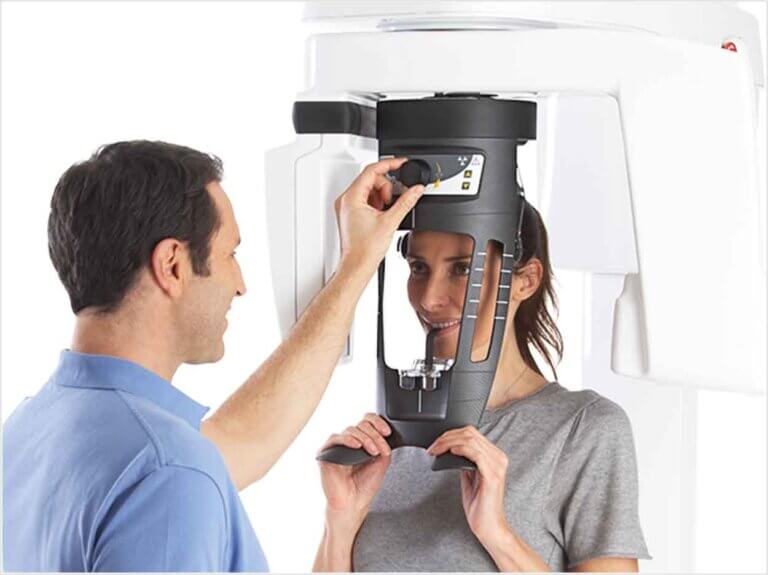CBCT Scan

What Is A CBCT Scan?
A Cone Beam Computed Tomography (CBCT) scan is a non-invasive imaging technique that produces highly detailed 3D images of your teeth, jawbone, and surrounding structures, allowing for precise diagnosis and treatment planning. CBCT scans are widely used in procedures like dental implant planning, oral surgery, assessing TMJ disorders, and diagnosing complex issues like impacted wisdom teeth.
With its superior imaging quality, CBCT has become essential in delivering personalized, effective dental care. Before deciding whether a CBCT scan is right for you, here are a few important things to know:
- Who Needs A CBCT Scan?
- Benefits Of CBCT Scans
- Alternative Treatments To CBCT Scans
- How Much Does CBCT Scan Cost?
- Steps In The CBCT Scan Procedure
- Can I Have CBCT Scan If I Am Pregnant?
- Frequently Asked Questions About CBCT Scans
If you have any further questions about CBCT Scans or other dental services offered at Atlas Dental, please contact us.

Free phone consultation
Have questions about CBCT Scans? Schedule a free phone consultation with our Toronto dentist.

5 star google reviews
Our patients love us! See for yourself why more and more people are choosing Atlas Dental for their CBCT Scans.

Book CBCT Scan Online
We provide quick and convenient CBCT Scan Service in Toronto. Book Online.
Who Needs A CBCT Scan?
CBCT scans are invaluable for diagnosing and planning treatments for specific dental conditions. While not necessary for every patient, they’re recommended for:
- Dental Implant Planning: CBCT scans are crucial for assessing the jawbone’s structure and ensuring safe and precise implant placement.
- Impacted Teeth Assessment: Whether dealing with impacted wisdom teeth or other molars, CBCT scans help oral surgeons plan extractions by visualizing the tooth’s position.
- TMJ Disorder Diagnosis: For patients suffering from jaw pain or discomfort, CBCT scans provide detailed images of the temporomandibular joint, helping guide treatment.
- Root Canal Complications: When standard X-rays fall short, CBCT scans offer clear visuals of the root canal system, aiding in the diagnosis of fractures or infections.
- Pathologies and Tumors: CBCT scans can help detect and assess oral cysts, tumors, and other pathologies, providing critical information for timely treatment.
- Orthodontic Treatment Planning: Orthodontists use CBCT scans to create precise, customized treatment plans for braces or Invisalign.
- Dental Trauma Evaluation: For patients with dental injuries, CBCT scans help assess damage to teeth, the jawbone, and soft tissues.
Dentists carefully consider the risk-benefit ratio before recommending CBCT scans and ensure that the benefits outweigh the potential risks, especially for pregnant women and children. If you have further questions about CBCT Scans, please contact us.
Benefits Of CBCT Scans
There are several reasons why CBCT scans have become a cornerstone of dental diagnostics:
- 3D Imaging Precision: CBCT provides high-definition, three-dimensional images that give dental professionals a complete view of the mouth and jaw from multiple angles.
- Improved Diagnostic Accuracy: Unlike 2D X-rays, CBCT scans reveal fine details that aid in early detection of abnormalities or complex dental conditions.
- Personalized Treatment Plans: Whether planning for implants, oral surgeries, or orthodontic treatments, CBCT allows for better precision and tailored care.
- Single Scan Efficiency: A single CBCT scan can provide all the information needed, reducing the need for additional X-rays and limiting radiation exposure.
- Quick and Non-Invasive: The procedure takes just seconds, with no need for contrast dyes or special preparation.
- Enhanced Patient Comfort: Most patients find the process quick and comfortable, which reduces anxiety and discomfort.
- Greater Implant Success: By providing critical details on bone density and nerve locations, CBCT scans help ensure successful dental implant placement.
- Visualization of Soft Tissues: While primarily for bone and teeth, CBCT also offers insight into surrounding soft tissues, aiding in TMJ disorder assessments.
The advantages of CBCT technology make it an invaluable asset in modern dentistry, contributing to improved diagnostic accuracy, treatment outcomes, and patient satisfaction. If you have further questions about CBCT Scans, please contact us.

Alternative Treatments To CBCT Scans
If you’re concerned about undergoing a CBCT scan, there are alternative imaging methods available:
- Traditional X-rays: Offer basic two-dimensional images useful for routine dental exams.
- Panoramic Radiographs: Capture a broad view of the entire mouth, helpful for assessing development and impacted teeth.
- MRI Scans: Provide detailed images of soft tissues without radiation but are more expensive and less accessible.
- Clinical Examinations: In some cases, a thorough exam may provide enough information without the need for advanced imaging.
Dental professionals will carefully evaluate your specific dental concerns, medical history, and risk factors before recommending the most suitable imaging option. The goal is always to ensure patient safety and provide the most accurate and appropriate dental care. If you have further questions about CBCT Scans, please contact us.
Cost of CBCT Scan
The cost of a CBCT scan ranges from $234 to $399 depending on the size of the scan. Expedited reports require an additional $50 surcharge. The codes relevant to CBCT Scans in the Ontario Dental Association’s Suggested Fee Guide appear as follows:
Radiographs, Cone Beam Computerized Tomography (CBCT), Acquisition, Processing and Interpretation
- 07041 – Small field of view (e.g. sextant or part of, isolated temporomandibular joint): $234
- 07042 – Large field of view (1 arch): $315.90
- 07043 – Large field of view (2 arches): $399
CBCT scans are usually considered a supplementary service by dental insurance plans and may or may not be covered by your dental insurance. Be sure to find out from your dental insurance plan provider how much you are eligible for before going ahead with dental treatment.
For patients without dental insurance, Atlas Dental is pleased to offer dental financing through iFinance Dentalcard. Affordable payment plans start at 7.95% for terms of 6 months to 6 years. To learn more about Dentalcard dental treatment financing, follow this link.
Steps In The CBCT Scan Procedure
Undergoing a CBCT scan is a quick, straightforward process. Here’s what you can expect:
- Preparation: You’ll be given instructions before the scan. The dental staff will address any concerns and get your consent.
- Removing Metal Objects: You’ll need to remove any metal objects from your head and neck area, such as jewelry or glasses.
- Head Positioning: You’ll sit or lie down, with your head positioned securely to ensure accurate imaging.
- Radiation Protection: The staff will use protective measures, like lead aprons, to minimize radiation exposure.
- Scan: The CBCT machine rotates around your head, capturing images in about 10-40 seconds.
- Image Processing: The data is processed, and your dentist or oral radiologist will analyze the images to make a diagnosis.
- Follow-up: Your dentist will explain the results and recommend treatment options.
With proper preparation and adherence to safety protocols, the CBCT scan procedure provides valuable insights that aid in delivering effective and personalized dental care, contributing to improved oral health outcomes. If you have further questions about CBCT Scans, please contact us.

Can I Have CBCT Scan If I Am Pregnant?
CBCT scans involve ionizing radiation, which can pose risks during pregnancy, particularly in the first trimester. In most non-emergency cases, dentists recommend postponing the scan until after childbirth. If necessary, special precautions, like using lead shields, will be taken to protect your baby.
The health and well-being of both the mother and the developing baby are of utmost importance. If there are any uncertainties or concerns regarding a CBCT scan during pregnancy, do not hesitate to contact us.
Frequently Asked Questions About CBCT Scans
- Do I need to prepare for a CBCT scan?
Please read out CBCT Scan Pre-Visit Instructions. You may be asked to remove any metal objects, such as jewelry or glasses, before the scan to avoid interference with the imaging.
- How long does a CBCT scan take?
The scanning process typically takes less than a minute. However, the entire appointment may take 10-15 minutes, including preparation and reviewing the results.
- Is a CBCT scan painful?
No, a CBCT scan is completely painless. You simply remain still while the machine rotates around your head to capture the images.
- How is a CBCT scan different from a medical CT scan?
CBCT scans use a cone-shaped X-ray beam and focus on the head and neck area, providing more precise images with lower radiation exposure compared to traditional medical CT scans.
A CBCT scan is a powerful diagnostic tool that provides detailed 3D images to support accurate treatment planning and care. If there are any uncertainties or concerns regarding a CBCT scan during pregnancy, do not hesitate to contact us.

